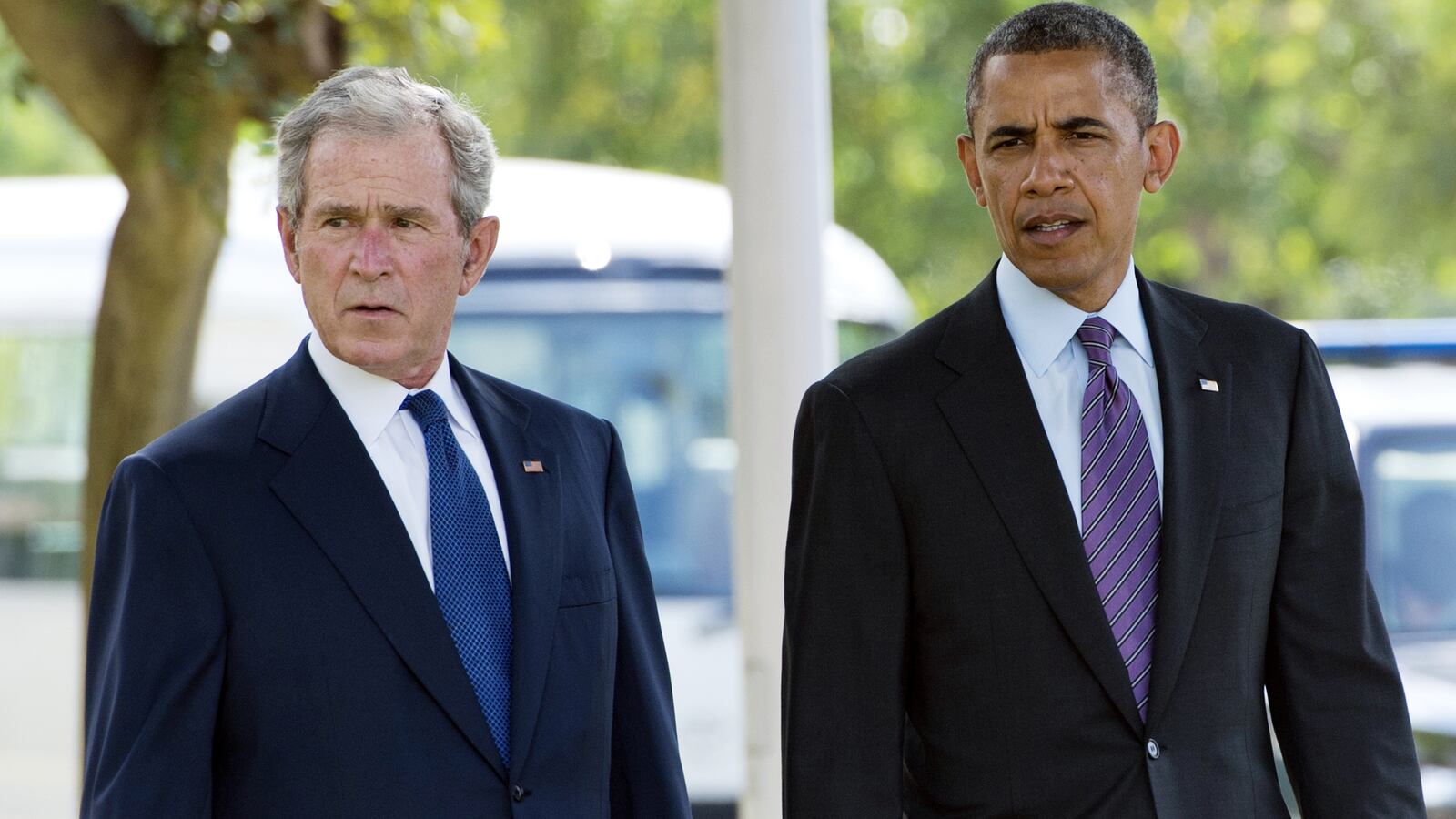Who says that the bipartisan spirit is dead? Just last week Pew Research listed “incompetent” as the word most frequently associated with President George W. Bush and President Obama. A day later the administration announced that it was putting Obamacare’s much-vaunted employer mandate on hold for a year, until January 1, 2015, even as television cameras steadily streamed pictures from Cairo of the lethal tumult once known as the Arab Spring.

Bush’s incompetence was born of excess idealism. Rather than seeing a region mired in muck, he envisioned a world created anew and ignored the question of what happens the day after. As for Obama, he has treated legislative victory as an end in itself while ignoring the reality of actual implementation. If Americans needed any further evidence that the respective signature “achievements” of Bush and Obama were failures wrapped in untidy and costly bows, there they were in plain sight.
The latest events from Tahrir Square reminded us that Bush 43’s freedom agenda was a chaotic and bloody mess that left America worse off, with thousands of American soldiers dead and tens of thousands wounded. Apparently the former president stubbornly clings to his dream of democracy sprouting from the soil of the Arab world, telling ABC News on Tuesday that democracy is an evolutionary process that takes time, much as he had proclaimed 10 years earlier that the war in Iraq was the latest front in the “global democratic revolution.” On Wednesday Morsi was history, and democracy had moved irresistibly forward.
For the record, potentially democratic revolutions have come and gone. According to Freedom House, the number and percentage of electoral democracies in 2012 are both lower than in 2001, when Bush 43 took office, while the greatest jump in democracy occurred between 1989 and 1999, coinciding with the end of the Cold War. These days, instead, we witness elections followed by majoritarian mob rule—what Fareed Zakaria has called “illiberal democracy.”
Obamacare? The public finds itself justified in its longstanding visceral opposition to a wholesale overhaul of our health-care delivery system, while the president and his supporters struggle to defend a grotesquery of their own making. A program designed as a payoff to Obama’s political core is now morphing into a costly nightmare, with insurers heading for the exits, corporate America and its lobbyists winning a brief reprieve, and younger Americans left holding the bag as the economy grinds along at a snail’s pace.
According to the Bible, pride goes before the fall. And so it repeatedly has. Bush the Younger once quipped, “Some folks look at me and see a certain swagger, which in Texas is called ‘walking.’” Mission accomplished, anyone?
For his part, Obama told his 2008 campaign political director Patrick Gaspard that “I think that I’m a better speechwriter than my speechwriters. I know more about policies on any particular issue than my policy directors. And I’ll tell you right now that I’m gonna think I’m a better political director than my political director.”
“Know more about policies”? Sure you do, Mr. President.
The fact is that Obamacare has been in trouble for some time. During the spring Max Baucus, the Senate Finance Committee chairman, rightfully acknowledged that Obamacare, a.k.a. the Affordable Care Act, was a “huge train wreck” coming down the tracks. Baucus’s critique is particularly damning, because he authored ACA and was boss and mentor to Jim Messina—the former White House deputy chief of staff who led Obama’s reelection effort.
The delay in implementing the employer mandate is just another in a series of policy missteps. Previously the rollout of small-business insurance exchanges had been postponed; long-term care, a piece of Obamacare central to gleaning support from baby boomers, had been jettisoned; the Medicaid mandate had been struck down by the Supreme Court; and health-care insurance premiums for healthy Americans—the demographically valuable cohort upon whom ACA rests—were projected to double or even triple. To top it off, popular uncertainty surrounds whether the federal government will have exchanges ready to enable individuals to purchase mandated insurance coverage beginning this October.
Taken together, Obama and Bush 43 are reminiscent of who and what preceded the two decades of presidential competence running from 1981 until 2001. When you think of Bush 43 and Obama, think Johnson, Nixon, and Carter, not Reagan, Bush 41, or Clinton.
In Reagan, Bush Sr., and Clinton, America was fortunate to have presidents who had what it took to get the job done, did more good than harm, and left the country in better shape than they found it. Each adapted to the demands of the job and the tasks at hand. They could shape events and respond to the unexpected with a degree of deftness; not everything needed to be scripted or read from a teleprompter. Politics mattered, but so did country.
During their terms, the Cold War came to a peaceful end, we became reacquainted with prosperity, and our position in the world was restored. After enduring Lyndon Johnson and Vietnam, Richard Nixon and Watergate, and Jimmy Carter and disgrace, America could finally exhale in 1981 and did so for 20 years. Not anymore.
These days we have no sense of when and how our current spate of bipartisan ineptitude will end. Yes, January 20, 2017, will mark the end of Obama’s time in office. But what’s next and what until then?
Obama barely talks to the Democrats and is incapable of communicating with congressional Republicans (for his part, House Speaker John Boehner can’t corral his caucus). But beyond the mechanics of legislation, Obama appears to be over his head. Winning the hearts of the Democratic donor base is one thing, but imposing America’s will on foreign governments, gaining Vladimir Putin’s respect, and mastering the implementation of signature legislation are different challenges, and right now Obama seems lacking.






